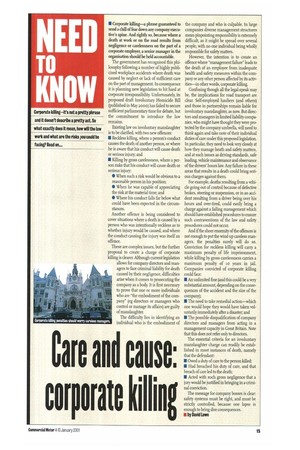Care and cause: corporate lin
Page 17

If you've noticed an error in this article please click here to report it so we can fix it.
• Corporate killing—a phrase guaranteed to send a chill of fear down any company executive's spine. And rightly so, because where a death at work or on the road results from negligence or carelessness on the part of a corporate employer, a senior manager in the organisation should be held accountable.
The government has recognised this philosophy following a number of highly publicised workplace accidents where death was caused by neglect or lack of sufficient care on the part of management. In consequence it is planning new legislation to hit hard at corporate irresponsibility. Unfortunately, its proposed draft Involuntary Homicide Bill (published in May 2000) has failed to secure sufficient parliamentary time for debate, but the commitment to introduce the law remains.
Existing law on involuntary manslaughter is to be clarified, with two new offences: • Reckless killing, where a person's conduct causes the death of another person, or where he is aware that his conduct will cause death or serious injury; and • Killing by gross carelessness, where a person risks that his conduct will cause death or serious injury: • When such a risk would be obvious to a reasonable person in his position; • When he was capable of appreciating the risk at the material time; and • Where his conduct falls far below what could have been expected in the circumstances.
Another offence is being considered to cover situations where a death is caused by a person who was intentionally reckless as to whether injury would be caused, and where the conduct causing the injury was itself an offence.
These are complex issues, but the further proposal to create a charge of corporate killing is clearer. Although current legislation allows for company directors and managers to face criminal liability for death caused by their negligence, difficulties arise when it comes to prosecuting the company as a body. It is first necessary to prove that one or more individuals who are "the embodiment of the company" (eg directors or managers who control or manage its affairs) are guilty of manslaughter.
The difficulty lies in identifying an individual who is the embodiment of the company and who is culpable. In large companies diverse management structures mean pinpointing responsibility is extremely difficult, as it might be spread over several people, with no one individual being wholly responsible for safety matters.
However, the intention is to create an offence where "management failure" leads to the death of an employee from inadequate health and safety measures within the company or any other person affected by its activities—in other words, corporate killing.
Confusing though all the legal-speak may be, the implications for road transport are dear. Self-employed hauliers (and others) and those in partnerships remain liable for involuntary manslaughter, as now. But directors and managers in limited liability companies, who might have thought they were protected by the company umbrella, will need to think again and take note of their individual duties of care under this proposed legislation. In particular, they need to look very closely at how they manage heath and safety matters, and at such issues as driving standards, safe loading, vehicle maintenance and observance of the drivers' hours law. Any failure in these areas that results in a death could bring serious charges against them.
For example, deaths resulting from a vehicle going out of control because of defective brakes, steering or suspension, or in an accident resulting from a driver being over his hours and over-tired, could easily bring a charge against a failing management which should have established procedures to ensure such contraventions of the law and safety procedures could not occur.
And if the sheer enormity of the offences is not enough to put the wind up careless managers, the penalties surely will do so. Conviction for reckless killing will carry a maximum penalty of life imprisonment, while killing by gross carelessness carries a maximum penalty of io years in jail. Companies convicted of corporate killing could face: • An unlimited fine (and this could be a very substantial amount, depending on the consequences of the accident and the size of the company); • The need to take remedial action—which one would hope they would have taken voluntarily immediately after a disaster; and • The possible disqualification of company directors and managers from acting in a management capacity in Great Britain. Note that this does not refer only to directors.
The essential criteria for an involuntary manslaughter charge can readily be established in most instances of death, namely that the defendant: • Owed a duty of care to the person killed; • Had breached his duty of care, and that breach of care led to the death; • Acted with such gross negligence that a jury would be justified in bringing in a criminal conviction.
The message for company bosses is dear: safety systems must be right, and must be strictly controlled, because one lapse is enough to bring dire consequences.
MI by David Lowe




























































































